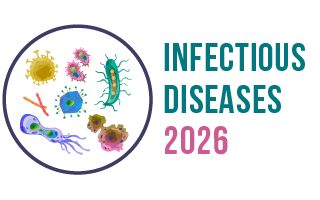4th International Conference on
Infectious Diseases
September 09-10, 2026 | Barcelona, Spain

Infectious Diseases 2026

Shaheed Mohtarma Benazir Bhutto Institute of Trauma Karachi, Pakistan
Abstract:
Multidrug-resistant (MDR) gram-negative bacteria (GNB) infections pose a significant global health threat, challenging healthcare systems worldwide. Gram-negative bacteria, including Escherichia coli, Klebsiella pneumoniae, Pseudomonas aeruginosa, and Acinetobacter species have developed resistance to multiple antibiotics, limiting treatment options and increasing the risk of treatment failure and adverse outcomes. This study aimed to analyze the trends of micro-organisms isolated from blood culture and their carbapenem resistance in a one of the largest public sector trauma center in Pakistan from 2018 to 2022. We obtained data from the Microbiology department on the predominant micro-organisms and their carbapenem susceptibility. We also obtained data from the Pharmacy department on the consumption of meropenem and colistin and calculated the defined daily doses (DDD) according to the World Health Organization guidelines. The data showed a significant rise in positivity from 2% in 2018 to 37% in 2022. The carbapenem resistance increased dramatically in Klebsialla,pneumoniae from 20% in 2018 to 70% in 2022. The carbapenem resistance also increased in E.coli, Pseudomonas Aeruginosa and Acinetobacter species, reaching 46%, 56% and 90%, respectively. The antimicrobial consumption of both meropenem and colistin showed a gradual upward trend over the five-year period. There is a significant increase in positive cases caused by Gram-negative organisms, indicating a growing prevalence of infections with increasing rates of resistance observed in multiple Gram negative organisms. These findings highlight the need for proactive antimicrobial stewardship, effective infection control measures, and the exploration of alternative treatment approaches to address the escalating threat of antimicrobial resistance.
Biography:
Dr. Sadia Amir is a renowned physician and Infectious Disease Consultant with an extensive career spanning over two decades. She is widely recognized for her expertise in treating and managing a wide range of infectious diseases, including but not limited to viral infections, bacterial infections, and fungal infections. Dr. Amir is a highly respected member of the medical community and is frequently invited to speak at conferences and seminars. She is also a regular contributor to medical journals and has published numerous articles on infectious diseases.
